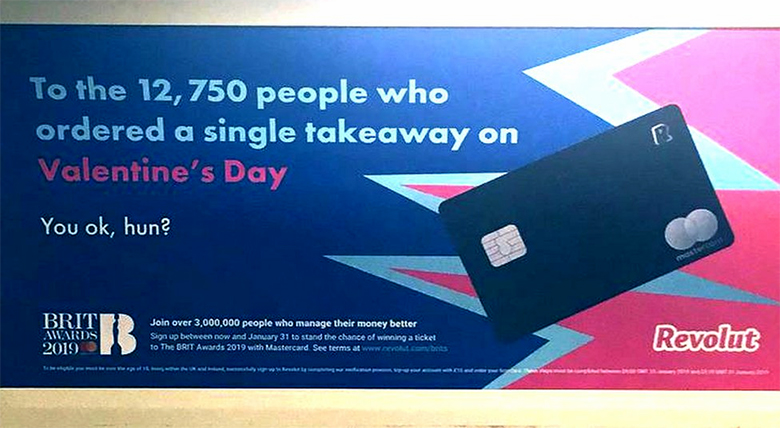In mid February, UK fintech company Revolut hit the headlines when it allegedly used customer data for a controversial ad campaign.
Strewn across the London underground, Revolut used various alleged statistics on their customers’ spending habits to show how many of their customers had bought a vegan sausage roll in the last month, had set up a monthly food budget labelled “Brexit Survival Fund” and – most controversially – had bought a meal-for-one last Valentine’s Day.
The campaign fell flat on its face when many millennials called out the fintech company for being out of touch and “single-shaming”. This anger intensified when it was revealed that Revolut’s statistics were completely made up – a fact that the fintech was actually keen to highlight when the backlash grew. The firm does have access to customer spend but not what has been purchased.
Data abuse
The controversy highlights questions around how tech companies – that have access to huge volumes of customer data – actually use it. According to research by the Pew Institute that came out towards the end of last year, 74% of Facebook users 18 years or older in the US have either deleted the app, taken a break from checking the app or adjusted their privacy settings. This follows revelations that the former consulting firm Cambridge Analytica had collected data on tens of millions of Facebook users without their knowledge.
Digital banks run a similar risk of alienating millennials, who by the end of the year will overtake the baby-boomer generation in size and by 2025 will make up three quarters of the global workforce.
In Australia, buy-now, pay-later companies such as Afterpay and Openpay are increasingly popular with the younger generation because of their flexible payment options via mobile apps. Ordering and paying for a taxi in Europe is achieved with a touch of a button. In China, small street vendors serving up steamed buns and breakfast pancakes for less than a $1 a pop take payments from university and school students via smart phones through apps such as Alipay and WeChat.
And in the US, “to venmo” has become a legitimate verb among those increasingly turning to digital solutions for cash issues.
If fintech companies use data – real or otherwise – that alienates, their main client base of millennials will begin to shun companies that don’t respect their boundaries. Just like vintage record players, Polaroid cameras and your mum’s bell-bottom jeans, perhaps cash will come back into fashion.
NOTE: You can not find the right trading strategy? if you have no time to study all the tools of the trade and you have not funds for errors and losses – trade with the help of our autotrading mt4 forex robot developed by our professionals. Also you can testing in Metatrader our robot scalper .
Signal2forex review


 Signal2forex.com - Best Forex robots and signals
Signal2forex.com - Best Forex robots and signals




